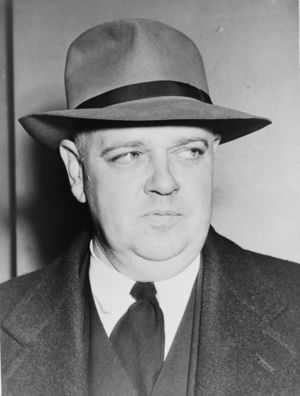Whittaker Chambers
Whittaker Chambers, a Columbia College student in the early 1920s, became a Soviet spy. His abandonment of communism during Stalin's purges led to his willingness to testify against the espionage activities of fellow Columbian Alger Hiss, among others.
Chambers entered Columbia in 1921, and his classmates at the time included Meyer Schapiro, Lionel Trilling, and Louis Zukofsky. Trilling later made him the main character in his novel Middle of the Journey.
Sam Tannenhaus' biography of Chambers discussed his affinity for Columbia's campus:
- "Physically Columbia was much more to Chambers' liking than Williams, a distinctively urban campus with tall peaked-roofed buildings linked by crowded walks. There were pastoral spaces as well, with statuary and plantings, and a great stretch of lawn where student soldiers had drilled in formation in 1917-18. Beyond the borders of the terraced campus were the diverse attractions of Manhattan's Upper West Side, the busy commercial streets, including Broadway with its cheap restaurants. To the west ran Riverside Drive, where grand apartment houses, some of them modeled on Tuscan villas, jutted out from bluffs overlooking the Hudson River; to the east was Morningside Park, a high ridge that rose up steeply from the valley of Harlem. The 1920's were a glorious decade for Columbia. Long a prestigious local institution, it had recently become, under President Nicholas Murray Butler, the model of a twentieth-century urban university."[1]
Chambers' professors and classmates found him brilliant and believed he had a future as a major poet or novelist. However, upon publishing a "blasphemous" and "atheistic" dramatic work entitled "A Play for Puppets" in the now-defunct Columbia literary magazine The Morningside, Chambers left Columbia. It is unclear whether he left on his own accord or was expelled.
References
- ↑ Sam Tannenhaus' biography of Chambers, p. 22
